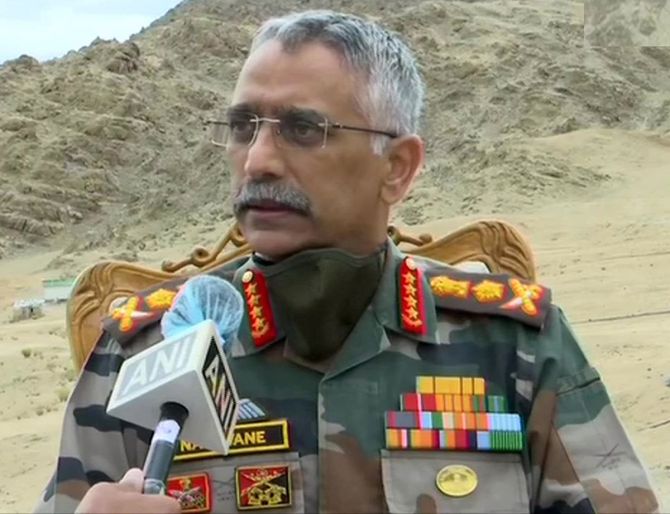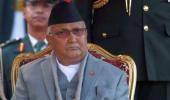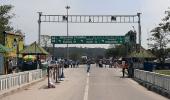A day ahead of his three-day crucial trip to Nepal, Chief of Army Staff General M M Naravane on Tuesday said he was eagerly looking forward to the visit and exuded confidence that it will go a long way in strengthening the 'bonds of friendship' between the armies of the two countries.

Gen Naravane's visit to Nepal from November 4-6 is largely aimed at resetting bilateral ties that came under severe strain following a bitter border row between the two countries.
The Chief of Army Staff is scheduled to call on President Bidya Devi Bhandari and Prime Minister K P Sharma Oli, besides holding talks with several other civilian and military leaders during the visit, officials said.
"I am delighted to be visiting Nepal on their kind invitation and to meet my counterpart Gen Purna Chandra Thapa, Chief of the Army Staff of the Nepali Army.
"I am sure this visit will go a long way in strengthening the bonds of friendship that the two armies cherish," Gen Naravane said.
The Chief of Army Staff said he was also grateful for the opportunity to call on Prime Minister Oli.
Gen Naravane's engagements in Nepal include a visit to the headquarters of the Nepalese Army, an address to the young military officers at Nepali Army's Staff College and attending a banquet to be hosted in his honour by Chief of Nepalese Army Gen Purna Chandra Thapa, they said.
In continuation of an age-old tradition that first started in 1950, Gen Naravane will be conferred the honorary rank of 'General of the Nepal Army' by the Nepalese President on Thursday.
India also confers the honorary rank of 'General of Indian Army' to the Nepal Army Chief.
"It is going to be a great honour for me to be conferred the honorary rank of General of the Nepali Army by the Hon'ble President of Nepal.
"I am looking forward eagerly to this visit," Gen Naravane said.
Officials said Gen Naravane will call on President Bhandari at the presidential palace following the ceremony.
He is scheduled to meet Prime Minister Oli on Friday.
His meeting with Prime Minister Oli is seen as important as it could lead to the resetting of ties leaving behind the map row.
Gen Naravane is also scheduled to hold extensive talks with Gen Thapa on a range of key issues such as ways to enhance military-to-military cooperation and boost the management of the nearly 1,800 km-long border between the two countries, they said.
It will be the first high-level visit from India to Kathmandu since ties between the two neighbours came under strain after the Himalayan nation came up with a new political map in May claiming several areas in Uttarakhand to be part of its territory.
It will also be Gen Naravane's second diplomatic mission.
Last month, he travelled to Myanmar along with Foreign Secretary Harsh Vardhan Shringla on a very significant visit during which India decided to supply an attack submarine to the Myanmarese Navy besides agreeing to further deepen military and defence ties.
Nepal had protested after Defence Minister Rajnath Singh inaugurated an 80-km-long strategically crucial road connecting the Lipulekh pass with Dharchula in Uttarakhand on May 8.
Nepal claimed that the road passed through its territory.
Days later, it came out with the new map showing Lipulekh, Kalapani and Limpiyadhura as its territories.
India too had published a new map in November 2019 showing the areas as its territories.
After Nepal released the map, India reacted sharply, calling it a 'unilateral act' and cautioning Kathmandu that such 'artificial enlargement' of territorial claims will not be acceptable to it.
In June, Nepal's Parliament approved the new political map of the country featuring areas which India maintains belong to it.
In its reaction, after Nepal's lower house of parliament approved the bill, India termed as untenable the 'artificial enlargement' of territorial claims by the neighbouring country.
India said Nepal's action violates an understanding reached between the two countries to resolve the boundary issues through talks.
Prime Minister Oli has been asserting that Lipulekh, Kalapani and Limpiyadhura belong to Nepal and vowed to 'reclaim' them from India.
The Lipulekh pass is a far western point near Kalapani, a disputed border area between Nepal and India.
Both India and Nepal claim Kalapani as an integral part of their territory -- India as part of Uttarakhand's Pithoragarh district and Nepal as part of Dharchula district.
India and Nepal have a robust defence and military relationship.
The Indian and Nepalese armies have been holding 'Suryakiran' military exercise since 2011.
The last edition of the exercise was held in Nepal in December last year.
Both the countries also hold regular meetings under the 'Nepal-India Bilateral Consultative Group on Security' with an aim to deepen the defence cooperation.
Nepal is important for India in the context of its overall strategic interests in the region and the leaders of the two countries have often noted the age-old 'Roti-Beti' relationship between the nations.
Land-locked Nepal relies heavily on India for the transportation of goods and services.
Nepal's access to the sea is through India, and it imports a predominant proportion of its requirements from and through India.
According to official data, Nepal's imports from India in 2017 were worth $6.52 billion, while its exports to the country were pegged at $420.18 million.
The figure for China, which was second on the list of countries from which Nepal imported its requirements, was five times lower than that of India.
On the security side, India's strategic thinkers are concerned over reports of China grabbing Nepalese territories in a number of locations along the borders between the two countries, though Kathmandu had clarified recently that there were no such encroachments.
According to reports, the Nepali, districts which have been victims of China's land-grabbing plan include Dolakha, Gorkha, Darchula, Humla, Sindhupalchowk, Sankhuwasabha and Rasuwa.









